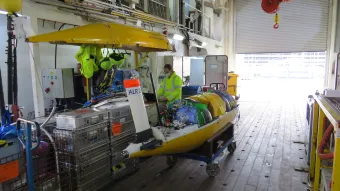
Engineers and scientists from the National Oceanography Centre (NOC) and the University of Southampton are set to trial new, state-of-the-art ocean biogeochemical sensors integrated with autonomous vehicles.
This final trial, in waters off the southwest coast of the UK, paves the way for low-emission oceanographic science and is part of the wider Oceanids programme. It will see the team pilot the latest version of the NOC’s Autosub Long Range (ALR) Autonomous Underwater Vehicle (AUV), better known as Boaty McBoatface, equipped with a range of novel sensors to demonstrate their capability for future autonomous missions anywhere in the ocean.
The offshore trials taking place this month will see the demonstration and evaluation of three sensor suites for autonomous measurements of: ocean nutrients, carbon chemistry, and the marine phytoplankton that contribute approximately half the photosynthesis on the planet. This expedition will demonstrate the value of the entire sensor-vehicle platform as a novel scientific tool.
The UK-Government funded Oceanids programme is developing autonomous technologies that will equip the UK with a world-class net zero oceanographic research infrastructure. The programme, led by the NOC, draws upon engineering and science expertise from across a wide range of academic, industry and government organisations. Its primary aim is to support the UK marine science community by developing low-emission technologies for enhanced data collection, particularly in unexplored and technologically challenging under-ice and deep-ocean environments.
Dr Kristian Thaller, Oceanids Programme Manager from the National Oceanography Centre, said: “Equipping the UK science community with low-emission research infrastructure is vital for our net-zero future. Oceanids is ensuring that UK researchers have access to cutting-edge autonomous sensor platforms that allow us to observe our oceans without the need for a supporting research ship, bringing us one step closer to that net-zero goal.”
As part of the Oceanids programme, partners at the NOC, University of Exeter and University of Southampton have been developing a suite of novel sensors capable of high-quality, real-time analysis of a wide range of biogeochemical parameters in the ocean. Integrated on robotic platforms such as the ALR, these sensors provide a powerful tool for observing and, therefore, understanding the ocean ecosystem, enabling evidence-based policy decision-making for CO2 emission reduction, ecosystem management and climate change mitigation. They also provide a low cost and low carbon alternative to traditional ship-based ocean observations.
Professor Mark Moore, Principal Scientist on the cruise from the University of Southampton, said: “The multiple groups of scientists and engineers on board are all really excited to finally be sailing and we are very much looking forward to demonstrating the capabilities of these new integrated sensor systems.”